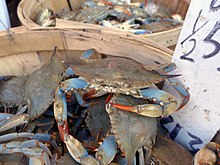Crab mentality

Crab mentality or crabs in a bucket (also barrel, basket or pot) is a way of thinking best described by the phrase "if I can't have it, neither can you".[1] The metaphor refers to a pattern of behaviour noted in crabs when they are trapped in a bucket. While any one crab could easily escape,[2] its efforts will be undermined by others, ensuring the group's collective demise.[3][4][5]
The analogy in human behaviour is claimed to be that members of a group will attempt to reduce the self-confidence of any member who achieves success beyond the others, out of envy, resentment, spite, conspiracy, or competitive feelings, to halt their progress.[6][7][8]
Impact on performance
The impact of crab mentality on performance was quantified by a New Zealand study in 2015 which demonstrated up to an 18 per cent average exam result improvement for students when their grades were reported in a way that prevented others from knowing their position in published rankings.[9]
See also
References
- ^ L. Douglas Wilder (October 1, 2015). Son of Virginia: A Life in America's Political Arena. Lyons Press. p. 185. ISBN 978-1-4930-1952-6.
- ^ Low Robin Boon Peng (2016). Good Intentions Are Not Enough: Why We Fail At Helping Others. World Scientific. p. 104. ISBN 978-981-320-059-3.
- ^ Sudipta Sarangi (April 1, 2013). "Capturing Indian 'Crab' Behaviour". The Hindu. Retrieved December 1, 2015.
- ^ Massie Santos Ballon (May 14, 2010). "Crab Mentality". Philippine Daily Inquirer. Archived from the original on September 25, 2013.
- ^ Miller, Carliss D. (January 2015). "A Phenomenological Analysis of the Crabs in the Barrel Syndrome". Academy of Management Proceedings. Academy of Management. doi:10.5465/AMBPP.2015.13710abstract. Retrieved 18 July 2016.
- ^ Manuel B. Dy (March 3, 1994). Values in Philippine Culture and Education. Council for Research in Values and Philosophy. p. 40. ISBN 978-1-56518-041-3.
- ^ Herbert A. Leibowitz (December 31, 1994). Parnassus: Twenty Years of Poetry in Review. University of Michigan Press. p. 262. ISBN 0-472-06577-7.
- ^ Albert Shanker (June 19, 1994). "Where We Stand: The Crab Bucket Syndrome". The New York Times. Retrieved December 1, 2015.
- ^ Spacey, S. 2015. Crab Mentality, Cyberbullying and "Name and Shame" Rankings. In Press, Waikato University, New Zealand. Retrieved on April 19th, 2015.
